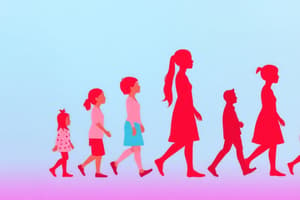Podcast
Questions and Answers
Which statement accurately defines race?
Which statement accurately defines race?
- A group of individuals that can be identified through genetic markers.
- A class of humans recognized by their social qualities or physical traits. (correct)
- A category of humans defined solely by cultural background.
- A group of humans distinguished by biological characteristics.
What describes normative age-graded influences?
What describes normative age-graded influences?
- Cultural shifts that alter the age of major milestones.
- Life events that happen to a generation due to historical events.
- Events or experiences that occur at a typical time for a specific age group. (correct)
- Unusual events affecting individuals uniquely.
What is a cohort?
What is a cohort?
- A demographic group defined by societal roles.
- A classification based on shared historical experiences. (correct)
- Individuals living in the same cultural context regardless of age.
- A group of people who undergo the same life event at different ages.
Which of the following describes a nonnormative influence?
Which of the following describes a nonnormative influence?
What does the life-span development approach emphasize?
What does the life-span development approach emphasize?
What is the primary focus of the scientific study of human development?
What is the primary focus of the scientific study of human development?
Which domain of development involves learning, language, and reasoning?
Which domain of development involves learning, language, and reasoning?
What does the concept of life-span development refer to?
What does the concept of life-span development refer to?
Which factor is NOT specifically mentioned as an influence on development?
Which factor is NOT specifically mentioned as an influence on development?
What is a significant aspect of psychosocial development?
What is a significant aspect of psychosocial development?
What does the term 'social construction' reflect in the context of human development?
What does the term 'social construction' reflect in the context of human development?
Which of the following represents a context of development?
Which of the following represents a context of development?
What is a key element of physical development?
What is a key element of physical development?
What best describes a polygamy family structure?
What best describes a polygamy family structure?
What factors are encompassed within socioeconomic status (SES)?
What factors are encompassed within socioeconomic status (SES)?
How are individualistic cultures primarily characterized?
How are individualistic cultures primarily characterized?
What is included in the definition of culture?
What is included in the definition of culture?
What characterizes an ethnic minority group?
What characterizes an ethnic minority group?
What is one distinguishing feature of collectivistic cultures?
What is one distinguishing feature of collectivistic cultures?
Which of the following factors does NOT influence human development?
Which of the following factors does NOT influence human development?
What is a characteristic of ethnicity?
What is a characteristic of ethnicity?
Flashcards are hidden until you start studying
Study Notes
Human Development Overview
- Scientific study of systematic changes and stability in individuals throughout life.
- Life-span development views human development as a lifelong process that can be scrutinized through scientific methods.
Domains of Development
- Physical Development: Involves body and brain growth, sensory capacities, health, and motor skills.
- Cognitive Development: Encompasses learning, language, reasoning, attention, memory, thinking, and creativity.
- Psychosocial Development: Focuses on emotions, personality, and social relationships.
Periods of the Life Span
- Life span is socially constructed, categorizing life into distinct periods.
- Perception of these life stages can vary across cultures; some may not recognize or conceptualize them similarly.
Influences on Development
- Key influences include heredity, environment, and maturation.
- Context of Development:
- Family Structure:
- Nuclear family consists of one or two parents with their children.
- Extended family includes grandparents, aunts, uncles, and cousins, forming a multigenerational network.
- Polygamous families involve one parent, typically the father, married to multiple spouses.
- Socioeconomic Status (SES): Influences include family income and educational levels affecting housing, healthcare, school access, and nutrition.
- Culture: A society's total way of life, transmitting beliefs, traditions, and behaviors. Included are individualistic cultures, focusing on personal goals, and collectivistic cultures, prioritizing group dynamics.
- Ethnicity and Race:
- Ethnic groups share cultural heritage, religion, and values, while ethnic minorities may face discrimination.
- Race is distinguished by physical characteristics and cannot be biologically defined.
- Family Structure:
Historical Context
- Influences can be normative (age-graded or history-graded) or nonnormative (unusual life events impacting development).
- Generational Concepts:
- Historical generation refers to those who experience significant events during formative years.
- Cohort consists of individuals born around the same time.
Timing of Influences
- Imprinting: Critical periods when specific development occurs.
- Critical Periods: Times when the individual is open to certain experiences crucial for proper development.
- Sensitive Periods: Times when development can be influenced, but it is not as rigid as critical periods.
Life-Span Development Approach
- Recognizes development as lifelong and multidimensional, with influences shifting between biology and culture across the lifespan.
- Plasticity: Development reflects adaptability and changing resource allocations influenced by historical and cultural contexts.
Studying That Suits You
Use AI to generate personalized quizzes and flashcards to suit your learning preferences.




